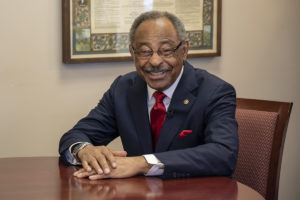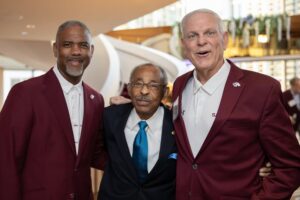
By Jeff Wilson
Roland Burris has held many titles, but none may be more apt than this: Trailblazer.
His own path began in Centralia and led him to Southern Illinois University, Germany, Howard University School of Law, Illinois state government, and eventually the U.S. Senate, but that only scratches the surface.
Beyond his expansive roles, his influence has impacted countless lives, and he has been equally impacted by those he has met along the way. It’s these relationships that inspired him to donate $100,000 to establish the Burris Financial Emergency Fund at Southern.

“The Lord has taken care of me. Why shouldn’t I try to make sure that I’m paving a way for others?” he said. “Set your goals. Dare to dream.”
Inspired by Paul
While a student at SIU, Burris had a roommate named Paul. His story became the inspiration for Burris’ emergency fund.
“Paul was a freshman from Du Quoin and worked at the post office in the military barracks that were in the student union. He had trouble getting lunch and dinner. He would drink water and lay down,” Burris said. “He didn’t receive any mail from home. We started helping him when we realized he wasn’t getting enough food. He was rail thin.
“One evening, Paul didn’t show up. He was gone. He had packed up and dropped out of school because he couldn’t get money from home to continue. That stuck with me. I knew if I ever got into a position to help … I don’t want to see any more Pauls.”
The emergency fund isn’t a scholarship. Funds from the endowment are dispersed through the Office of Anti-Racism, Diversity, Equity, and Inclusion to students who need financial help to stay enrolled at SIU.
“A few years ago, I was being honored on campus and a student approached me and gave me a hug. He said that he had received some of that money that bridged the gap. I just cried like a baby,” Burris said. “That’s what the fund was set up for. He was able to pay his bill and go on with his career. It hit me right in the gut.”
SIU & Carbondale
Burris came to SIU from Centralia in 1955 with four others, Bill Norwood, Leonard Taylor, Vernon Rush, and Charles Steptoe, with a plan to play football.
“We caught the train down to Carbondale, met with the coach (Albert Kawal), and then planned to get lunch,” he said. “There were limited places in Carbondale that would serve Blacks. We thought ‘Let’s go back to Centralia.’ Coach said he would feed us on campus, so we stayed.”
Carbondale was largely segregated in the late-1950s. Working with President Delyte Morris and others, that was something Burris set out to change.
“This was when race was really prevalent in that part of the state and across the country,” Burris said. “In terms of the university, there were no Blacks on the faculty, but I had no problems with instructors or deans. Blacks could not stay in the dorms until 1955 when Dr. Morris integrated the newly constructed Woody Hall.”
With a group of white and Black friends, Burris set out to document the issues in Carbondale with the hopes of integrating the city. As a junior, he was president of the Alpha Phi Alpha fraternity, which was planning its 25th anniversary celebration.
“Blacks couldn’t sleep in hotels and motels in Carbondale. We wanted to invite our older brothers, but they had no place to stay,” Burris said. “We decided to document segregation all across the city.”
Burris and a group of Black students would try and fail to book a room, get seated at restaurants, or try on clothes in stores. They would then send in a group of white students to do the same and record their success in doing so.
“We then met with Dr. Morris and the university’s lawyer, John Rendleman, and they could not believe it. They called a meeting with the Chamber of Commerce,” he said. “You could see the blood drain from the faces of these white men as they heard the stories. It was quite an experience. Dr. Morris made it clear that this could not be tolerated, and they took it under advisement.”
It wasn’t until after Burris had left Carbondale that he received word of integration across the city.
“Willie Brown, a football player, sent me a letter saying that every entity in Carbondale was open to serve Blacks, students and otherwise,” Burris said. “That effort of documenting it and presenting it had worked. It was a growing experience for me. We learned how we could negotiate our futures.”
A launching pad
Burris made his mark as an outstanding student. During his junior year, he took a German class, and his professor approached him about an exchange program that SIU had with the University of Hamburg in Germany.
“It was a competition between 200 students, and they selected two, and I was one of them. It was the first time a Black student had been chosen,” Burris said. “So, I spent a year there working on my master’s degree, if you can imagine that.”
While there, Burris began studying international law and decided to pursue his law degree. Although he never finished his master’s, he earned his juris doctor from Howard University School of Law in Washington, D.C., in 1963.
“When my wife, Berlean, and I left Howard and headed back to Chicago, I said the only way I would return to D.C. was as vice president or a U.S. senator. Well, on January 16, 2009, I was sworn in as a U.S. senator,” he said.
When Barack Obama was elected president in 2008, it opened a U.S. Senate seat from Illinois. Burris was chosen by then-Gov. Rod Blagojevich to fill that spot.
“I was the first Black person in America to be appointed to a Senate seat,” Burris said. “I wasn’t a politician. I was a public servant – for my people and all people.”
Between law school and the Senate, Burris was the first Black person elected to statewide office in Illinois, winning the comptroller race in 1978. He was later elected as Illinois attorney general in 1990.
“At 15 years old, I set two goals – become a lawyer and a statewide elected official – and I did both. Everything I prayed to the Lord for, I have achieved it,” Burris said. “SIU was a major player in my career. I am a fan of Southern Illinois University in Carbondale. It did so much for me and the people I know. I believe it gave me the greatest college experience anyone could have.”
